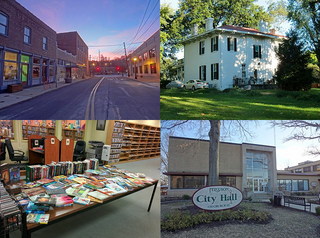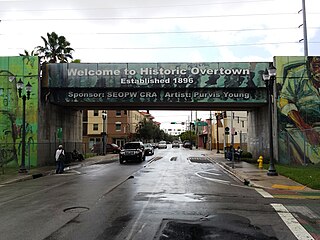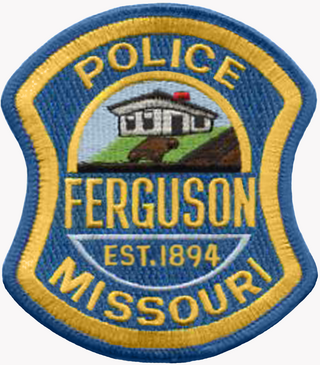Related Research Articles

Ferguson is a city in St. Louis County, Missouri, United States. It is part of the Greater St. Louis metropolitan area. Per the 2020 census, the population was 18,527.

Miami Gardens is a city in north-central Miami-Dade County, Florida, United States. It is located 16 miles (26 km) north of Downtown Miami with city boundaries that stretch from I-95 and Northeast 2nd Avenue to its east to Northwest 47th and Northwest 57th Avenues to its west, and from the Broward County line to its north to 151st Street to its south. The city's name originated from Florida State Road 860, a major roadway through the area also known as Miami Gardens Drive.

Overtown is a neighborhood of Miami, Florida, United States, just northwest of Downtown Miami. Originally called Colored Town in the Jim Crow era of the late 19th through the mid-20th century, the area was once the preeminent and is the historic center for commerce in the black community in Miami and South Florida.
The 1980 Miami riots were race riots that occurred in Miami, Florida, starting in earnest on May 18, 1980, following an all-White male jury acquitting four Dade County Public Safety Department officers in the death of Arthur McDuffie, a Black insurance salesman and United States Marine Corps lance corporal. McDuffie was beaten to death by four police officers after a traffic stop. After the officers were tried and acquitted on charges including manslaughter and evidence tampering, a riot broke out in the Black neighborhoods of Overtown and Liberty City on the night of May 17. Riots continued until May 20, resulting in at least 18 deaths and an estimated $100 million in property damage.
John Francis Timoney was an American policeman and law enforcement executive. He served as Chief of the Miami Police Department from 2003 to 2010. He was previously Commissioner of the Philadelphia Police Department (1998–2002) and held a variety of positions with the New York Police Department (1967–96), including its Chief of Department and First Deputy Commissioner. He worked for the Ministry of the Interior of Bahrain as a police consultant. Timoney drew both international praise and criticism for his handling of mass protests.

The Miami Police Department (MPD), also known as the City of Miami Police Department, is a full-service municipal law enforcement agency serving Miami, Florida. MPD is the largest municipal police department in Florida. MPD officers are distinguishable from their Miami-Dade Police Department counterparts by their blue uniforms and blue-and-white patrol vehicles.

The Ferguson Missouri Police Department (FPD) is a law enforcement agency serving Ferguson, Missouri. Since July 14, 2021, the Current Chief of Police has been Frank McCall since Former Chief Jason Armstrong resigned.

On August 9, 2014, 18-year-old Michael Brown was shot and killed by police officer Darren Wilson in Ferguson, Missouri, a suburb of St. Louis.

The Ferguson unrest were a series of protests and riots which began in Ferguson, Missouri on August 10, 2014, the day after the fatal shooting of Michael Brown by FPD officer Darren Wilson. The unrest sparked a vigorous debate in the United States about the relationship between law enforcement officers and African Americans, the militarization of police, and the use-of-force law in Missouri and nationwide. Continuing activism expanded the issues by including modern-day debtors prisons, for-profit policing, and school segregation.

"Hands up, don't shoot", sometimes shortened to "hands up", is a slogan and gesture that originated after the August 9, 2014, shooting of Michael Brown in Ferguson, Missouri, United States and then adopted at protests against police brutality in the U.S.A. The slogan implies one has their hands in the air, a common sign of submission, and is therefore not a threat to an approaching police officer. Witness reports from the Brown shooting are conflicted as to what Brown was doing with his hands when he was shot. One witness, who was later identified as Brown’s friend, claimed Brown had his hands in the air before being killed, although this witness later said he had made a false statement regarding Brown's hands being up. The same witness made multiple false statements during the investigation. In one instance he claimed Brown was shot in the back and turned around and said" Stop shooting. I don't have a gun". In another he claimed Brown was "executed" by the officer in an execution style killing. The forensic investigation later found those claims could not possibly be true. Also, many eyewitnesses testified in court that Brown's hands were not up but that he was rushing at the officer when shot.

Police reform in the United States is an ongoing left-wing political movement that seeks to reform systems of law enforcement throughout the United States. Many goals of the police reform movement center on police accountability. Specific goals may include: lowering the criminal intent standard, limiting or abolishing qualified immunity for law enforcement officers, sensitivity training, conflict prevention and mediation training, updating legal frameworks, and granting administrative subpoena power to the U.S. Department of Justice for "pattern or practice" investigations into police misconduct and police brutality.
The Ferguson effect is an increase in violent crime rates in a community caused by reduced proactive policing due to the community's distrust and hostility towards police. The Ferguson effect was first proposed after police saw an increase in violence following the 2014 shooting of Michael Brown in Ferguson, Missouri. The term was coined by Doyle Sam Dotson III, the chief of the St. Louis police, to account for an increased murder rate in some U.S. cities following the Ferguson unrest. Whether the Ferguson effect really exists is subject of discussions with many published studies reporting contradicting findings concerning whether there is a change in crime rates, number of 911 calls, homicides, and proactive policing. Furthermore, the effect and influence of the portrayal of police brutality in the media is also contested.
Earl Sampson is a black man from Miami Gardens, Florida, who, beginning in 2008, was repeatedly arrested by police for trespassing while he was at his own place of employment. The Miami Gardens Police Department convinced the owner of the Quickstop convenience store, Alex Saleh, to sign up for "The Zero-Tolerance Zone Trespassing Program". Afterwards police began targeting black customers who were standing in line to buy items at the store. Police officers also focused their attention on Sampson, whose only criminal conviction was for marijuana possession. During the five-year period from 2008 to 2013, Sampson was "unlawfully stopped-and-frisked, searched, seized, and/or arrested 288 times," for a total of 63 arrests, 33 of which resulted in court action. He was also searched over 100 times and jailed at least 56 times; the majority of all these events occurred at the Quickstop. Sampson pleaded guilty to the trespassing charges filed against him, since pleading not guilty would have meant remaining in jail, posting bond, meeting trial dates, and spending money.

On July 18, 2016, Charles Kinsey, a mental health therapist, was shot in the leg by a police officer in North Miami, Florida. Kinsey had been retrieving his 27-year-old autistic patient, Arnaldo Rios Soto, who had run away from his group home. Police encountered the pair while they were searching for an armed suicidal man. Kinsey was lying on the ground with his hands in the air, and trying to negotiate between officers and his patient, when he was shot. The officer who shot Kinsey said he had been aiming at the patient, who the officer believed was threatening Kinsey with a gun. Both Kinsey and his patient were unarmed.
The 1989 Miami riot was sparked after Miami Police Department (MPD) officer William Lozano shot Black motorcyclist Clement Lloyd on January 16, 1989. Lloyd, 23, was fleeing from another MPD officer who was chasing him for an alleged traffic violation. Lozano was on foot investigating an unrelated incident, heard about the situation on his police radio and later stated the motorcycle "veered toward him". Lozano fired a shot at the motorcycle, striking Lloyd in the head and killing him instantly. The motorcycle crashed into an oncoming car, injuring two occupants. Lloyd's passenger, Allan Blanchard, 24, died the following day from his injuries. Several Black witnesses stated that Lozano walked almost to the center of the street with his handgun and poised ready to shoot for several seconds as the motorcyle approached. Rioting began almost immediately after the shooting in Overtown, and on the following day in Liberty City, both predominantly Black neighborhoods of Miami, and continued until January 19 when the Chicago Bulls including star player Michael Jordan played a scheduled game in Overtown against the Miami Heat, who were in their inaugural season. Schools were closed and police cordoned off a 130-block area and teargassed rioting crowds.

Christopher J. Magnus is an American law enforcement professional who served as the commissioner of U.S. Customs and Border Protection from 2021 to 2022. He was previously chief of police in Tucson, Arizona; Fargo, North Dakota; and Richmond, California. He is an advocate of community policing and of sanctuary cities and states.

Hubert Arturo Acevedo is an American police officer who is the interim chief of police of the Aurora Police Department as of December 2022. Previously, he was the chief of police of the Houston Police Department, Austin Police Department, and Miami Police Department. Before becoming a police chief, he was a member of the California Highway Patrol.
"When the looting starts, the shooting starts" is a phrase originally used by Walter E. Headley, the police chief of Miami, Florida, in response to an outbreak of violent crime during the 1967 Christmas holiday season. He accused "young hoodlums, from 15 to 21", of taking "advantage of the civil rights campaign" that was then sweeping the United States. Having ordered his officers to combat the violence with shotguns, he told the press that "we don't mind being accused of police brutality". The quote may have been borrowed from a 1963 comment from Birmingham, Alabama police chief Bull Connor. It was featured in Headley's 1968 obituary published by the Miami Herald.
The 1982 Overtown riot was a period of civil unrest in Miami, Florida, United States, from December 28 to 30, 1982. The riot was caused by the shooting death of an African American man in the city's Overtown neighborhood by a Latino police officer on December 28, leading to three days of disorder that resulted in one additional death, numerous injuries and arrests, and widespread property damage.
References
- ↑ Ferguson Names Black Police Chief The New York Times, March 31, 2016
- ↑ New Ferguson Police Chief Sworn In The New York Times, May 9, 2016
- ↑ Byers, Christine. "Ferguson police chief resigning, city launching national search for replacement". Stltoday.com. Retrieved 12 January 2019.
- 1 2 Miami Herald "He was police chief following Michael Brown’s shooting. Now he’s coming back to Miami" October 13, 2018
- ↑ Miami Police Maj. Delrish Moss a finalist for top police spot in Ferguson Miami Herald, March 4, 2016
- 1 2 Miami police major to head Ferguson, Mo., PD USA Today, March 31, 2016
- ↑ Public Information office Miami Police Dept, accessed April 3, 2016
- ↑ Crime, riots shaped Miami Maj. Delrish Moss, now a finalist for top cop in Ferguson The Miami Herald, March 5, 2016
- ↑ Moss supporters say he's the right fit for Ferguson Archived 2016-04-15 at the Wayback Machine WBOC, April 1, 2016
- ↑ Ferguson, Missouri, Names 32-Year Veteran Miami Cop Delrish Moss to Lead Force NBC News, March 31, 2016
- ↑ Ferguson, Mo., swears in black police chief The Washington Post, May 9, 2016
- ↑ Ferguson's new police chief: His resume CNN, May 9, 2016